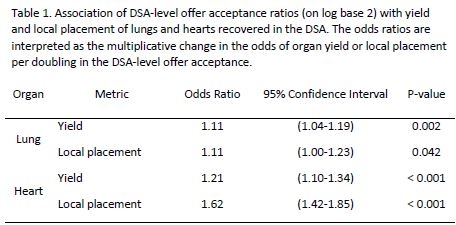Heart and Lung Offer Acceptance Practices Are Associated with Organ Yield and Local Placement
SRTR, Minneapolis.
Meeting: 2018 American Transplant Congress
Abstract number: B315
Keywords: Allocation, Heart, Lung, Prediction models
Session Information
Session Name: Poster Session B: Non-Organ Specific: Economics, Public Policy, Allocation, Ethics
Session Type: Poster Session
Date: Sunday, June 3, 2018
Session Time: 6:00pm-7:00pm
 Presentation Time: 6:00pm-7:00pm
Presentation Time: 6:00pm-7:00pm
Location: Hall 4EF
Below average offer acceptance practices could delay placement of donor hearts and lungs and may ultimately lead to organ discard. Recovered thoracic organs are rarely discarded; however, donors whose abdominal organs are recovered may have transplantable thoracic organs that are not recovered due to expected difficulties in placement caused by local programs' acceptance practices. Two measures of allocation efficiency are organ yield and local placement. Organ yield for, e.g., hearts is the number of hearts transplanted divided by the number of deceased donors with any organ recovered. Local placement is the proportion of, e.g., hearts transplanted in the donation service area (DSA) that procured the organ. To determine the impact of offer acceptance on allocation efficiency, we estimated the association of DSA-level offer acceptance with organ yield and local placement. Using offer data for donors recovered between July 1, 2016, and June 30, 2017, DSA-level offer acceptance ratios were estimated with a generalized linear mixed model (GLMM) with a random intercept for the DSA; an offset equal to the linear predictor from SRTR offer acceptance models adjusted for donor and candidate factors (https://www.srtr.org/reports-tools/risk-adjustment-models-offer-acceptance-preview/). The DSA-level odds ratios from the GLMMs were then included in a logistic regression for organ yield and local placement, adjusted for donor factors. Higher DSA-level offer acceptance was significantly associated with higher odds of lung yield (odds ratio = 1.11; P = 0.002) and heart yield (odds ratio = 1.21; P < 0.001). DSA-level offer acceptance was also significantly associated with local placement of transplanted lungs (odds ratio = 1.11; P = 0.042) and hearts (odds ratios = 1.62; P < 0.001). Improving thoracic offer acceptance may improve allocation efficiency and, ultimately, increase the number of transplants.
https://www.srtr.org/reports-tools/risk-adjustment-models-opos-preview/
CITATION INFORMATION: Wey A., Skeans M., Salkowski N., Kasiske B., Israni A., Snyder J. Heart and Lung Offer Acceptance Practices Are Associated with Organ Yield and Local Placement Am J Transplant. 2017;17 (suppl 3).
To cite this abstract in AMA style:
Wey A, Skeans M, Salkowski N, Kasiske B, Israni A, Snyder J. Heart and Lung Offer Acceptance Practices Are Associated with Organ Yield and Local Placement [abstract]. https://atcmeetingabstracts.com/abstract/heart-and-lung-offer-acceptance-practices-are-associated-with-organ-yield-and-local-placement/. Accessed February 16, 2026.« Back to 2018 American Transplant Congress

